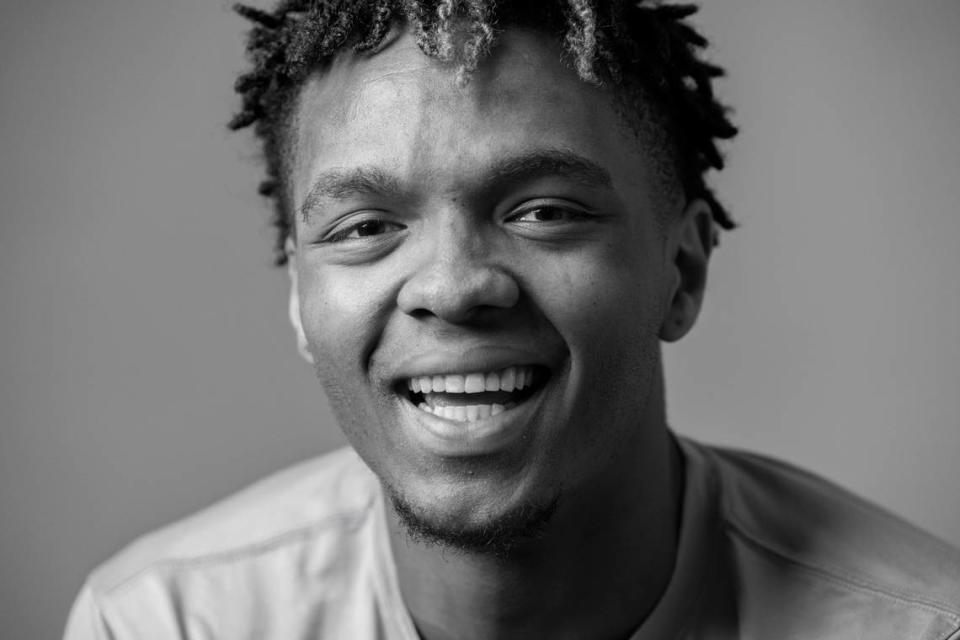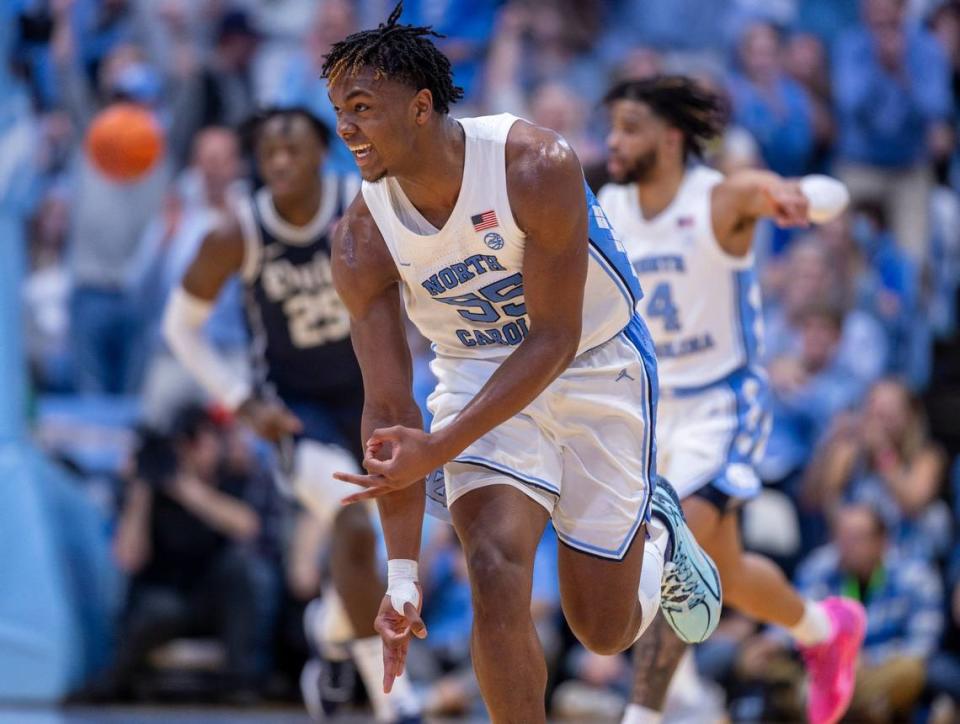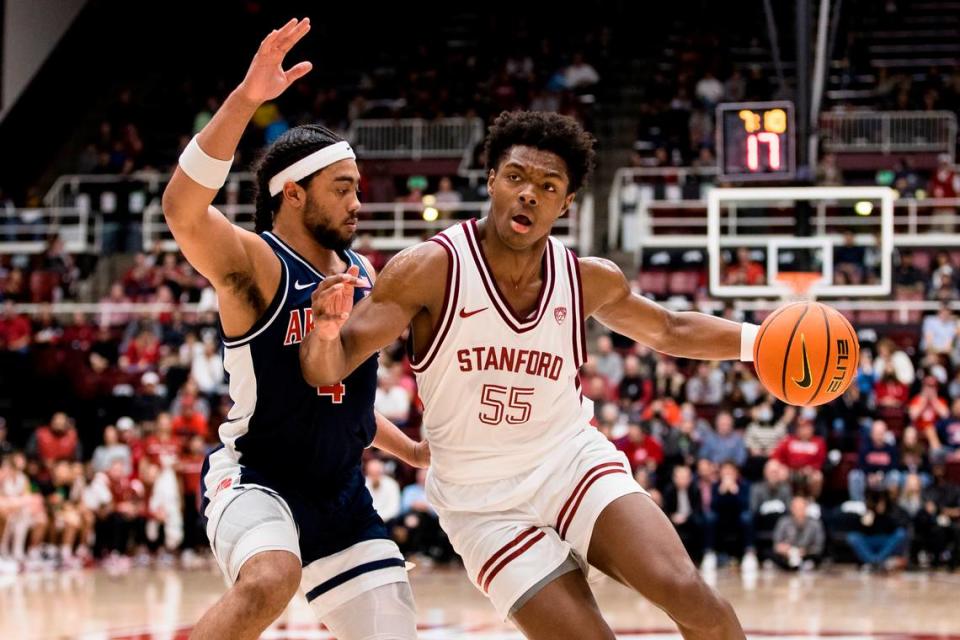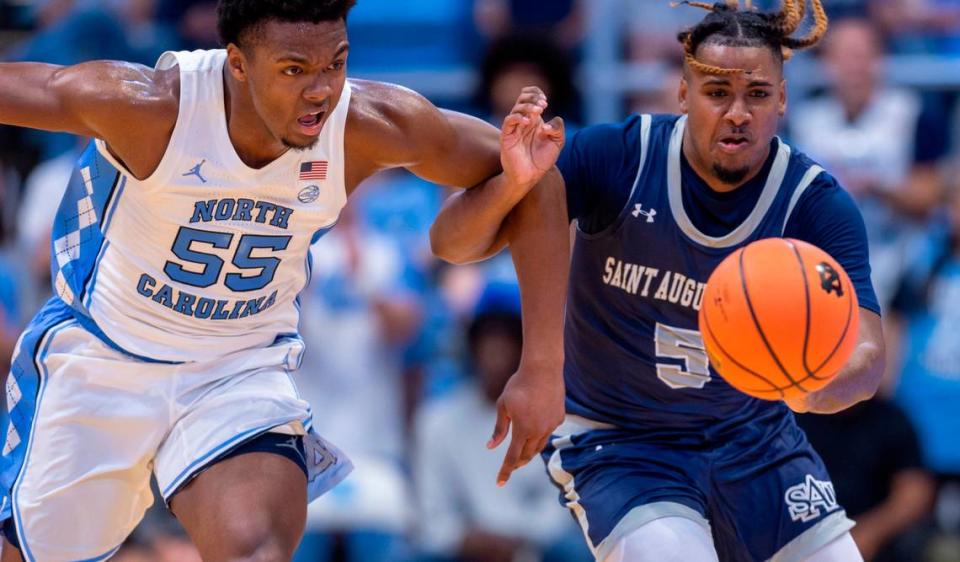How UNC landed Harrison Ingram, perhaps the most interesting player in college basketball
- Oops!Something went wrong.Please try again later.
- Oops!Something went wrong.Please try again later.
There is a better than average chance that today in America, or perhaps even in the world at large, someone will go online and become immersed in a virtual game of chess, without realizing it, against arguably the most interesting college basketball player in the country.
Harrison Ingram, North Carolina’s junior forward, has to at least be in the conversation.
The chess is only part of it, but not an insignificant part. Ingram plays every day on his preferred app, the efficiently-named chess.com. His username is an indistinguishable series of letters and numbers — perhaps “HarrisonIngram55” was already taken — so that his opponents can’t have any idea it’s him. And who knows who they are.

Maybe other college kids, or retirees, or a foreman at the plant on his lunch break, or the lawyer winding down after her long day in court, or who knows who — or where — all playing some online chess against the guy who’s been as important a part of the Tar Heels’ turnaround this season as anyone. It can be amusing to envision, Ingram checkmating folks in anonymity online one minute, while getting ready for practice or a team meeting the next.
And how’s his game?
“Pretty good,” he said during a recent interview. He broke into a big smile and began to nod, as if he had a secret he wanted to spill. “I’m solid. I’m confident in my chess game.”
He said it as though he was holding back, as if he knows he’s not just “pretty good,” but good good. As if maybe his chess game is as “solid” — his word — as what he can do on the basketball court. Ingram was 7 when his father taught him how to play chess and during his years at St. Marks High in Dallas, Ingram’s interest in the game accelerated. He joined the school’s Chess Club, and also happened to develop into one of the most coveted college basketball prospects in the country.
It’s not exactly the most common combination.
He visited UNC, among other schools, before he decided to accept a basketball scholarship to Stanford. More chess followed and, as luck had it, one of his roommates, from France, was “a big chess guy,” as Ingram described him recently.
“We had a little chess board in our room and we would play once a night,” Ingram said.
Soon enough, he became something of a menace on chess.com. A force to be reckoned with.

Not unlike his emergence at UNC over the past several months. While Ingram plays online chess every day, the in-person competition has waned. Among his Tar Heels teammates, only James Okonkwo, a native of England who transferred to UNC from West Virginia, plays chess, though “he doesn’t play as much as I do,” Ingram said. And so it’s not much of a competition.
“It’s not even close,” Ingram said.
The affinity for chess is part of his story and part of what separates him. There’s more:
That he’s majoring in economics, and aspires to own a company one day that handles not just hotels or real estate or restaurants, as he described it, but instead “a little bit of everything.” That he grew up in a house with two parents who’ve built a mini-empire of McDonald’s franchises throughout the Dallas-Fort Worth area; that he has embraced his newfound spotlight at UNC in an unusually-enthusiastic way, so much that he seized every opportunity to talk about it; that he was so amped for UNC’s home game against Duke that he said he blacked out and has no memory of it; that he has no agent, and handles all of his off-court business with the help of his brother.

Ingram could be a college basketball version of the guy from the old Dos Equis beer “Most Interesting Man in the World” commercials, which featured a ruggedly-handsome and bearded man engaging in all kinds of adventures and escapades — playing handball, freeing a bear from a trap, defeating a despot in an arm-wrestling contest — while a narrator in a regal tone says stuff like, “if opportunity knocks, and he’s not home, opportunity waits.”
Last summer, opportunity came for Ingram — and if he’d missed the call the first time his phone undoubtedly would’ve buzzed again. It was buzzing a lot in those days. And one of those calls led to perhaps the most interesting thing of all about him: In a college basketball world of constant transience; of coaches and schools and players evaluating each other on the transfer market, in search of a quick fit, Ingram and UNC found a perfect one in each other.
It hardly ever works out to this degree.
Would Ingram be a fit at UNC?
There are several reasons why UNC arrived in Washington, D.C., this week as the No. 1 seed in the ACC Tournament, and with a chance to earn a No. 1 seed when the NCAA Tournament starts next week. Foremost among them, RJ Davis, the senior guard, reached a higher level and became the ACC’s best player. Armando Bacot, the fifth-year forward, has played like he’s having fun again.
Cormac Ryan, when on, is among the conference’s most effective perimeter shooters. Elliot Cadeau, the freshman point guard, has been as advertised or perhaps a little better in his first college season. The addition of Ingram, meanwhile, has been as integral a component of the Tar Heels’ success as any.
Davis has clearly been UNC’s best player. There’s a case to be made, though, that Ingram has been UNC’s most important, given all the roles he plays, and plays well. In basketball parlance, he has been a glue guy. An energy man. He’s a sixth man who starts; a role player who stars. He’s positionless, in a good way. He can score. He can shoot. He can defend. He can rebound.
And even more significant than that, for coach Hubert Davis, is arguably everything else — all those quantities Ingram brings that aren’t easily found on a box score. The hustle plays. The presence in the locker room. The way Ingram has made it seem like he’s been at UNC for several years, instead of less than even a full one.

Indeed, his transition to UNC from Stanford has been seamless — so smooth that it stands out as an anomaly, even among the other success stories born of college basketball’s transfer portal. Navigating it, for coaches and their programs, has arguably become even more important than recruiting players out of high school. The portal certainly offers a greater degree of difficulty.
In high school recruiting, at least, the process often plays out over years. Relationships are forged. Players are evaluated over time. Visits can almost become routine, especially if a prospect is close to campus. For transfers, everything is condensed into weeks, at best. And that’s if a player hasn’t already made up his mind, within days (or before). Coaches must act quickly.
And how are they to know, really, how someone might fit into an established team or culture?
UNC, given its place in the sport, has attracted its share of high-profile players from the portal. Brady Manek, who transferred from Oklahoma, was an unquestioned hit; a fan and teammate favorite who helped lead the Tar Heels’ unlikely run to the national championship game in 2022. In his same transfer class, meanwhile, Dawson Garcia was the opposite — so much so that during that Final Four run his former teammates had to stifle their laughter when asked if they’d kept in touch with Garcia after he’d left the program earlier that season.
Why can one player turn out to be the perfect fit in every way while another struggles to fit in any way? How can an evaluation prove so accurate in one instance and so inaccurate in another?
How can a coach really know what they’re getting out of the portal? Or how a player will mesh?
“I don’t think you can be 100% sure,” said Hubert Davis, noting the obvious importance in doing “your due diligence in terms of in any recruitment, whether it’s transfer portal or high school.”
The transfer portal, he acknowledged, “goes a lot faster,” with Davis and his staff left to research not just a prospect’s basketball talent and ability, but the player’s relationships with teammates and college coaches and high school coaches and anyone else of significance.
“Those are factors that are weighed heavily,” he said.
He’d come to accept a truth, though, after his first two seasons as head coach — two seasons, it so happened, in which managing the portal, both the comings and the goings, more and more became a significant part of his job. On one end of a spectrum was Manek. On the other were players who might’ve had the talent or the intangibles to succeed, but not necessarily both.
“The one thing that is extremely hard and you cannot predict is how they will react on this stage,” Davis said. “It’s different. The light is bright here. The stage is big. And there’s other programs that are on this stage but no one’s higher than this stage. And so to predict how they will react, being on this type of stage, that’s something that you hope they can. But you can’t really predict.”
The weeks after the 2022-23 season ended were critical for Davis, whose team missed the NCAA Tournament after starting the season No. 1. The roster turnover began immediately, with seven UNC players eventually entering the portal. Davis and his staff went to work to find replacements. Ingram, who spent his first two seasons at Stanford, entered the portal on April 4, 2023.
Within minutes, his phone buzzed.
Becoming a Tar Heel
Ingram’s first two calls came at nearly the same exact time. The first was from Hubert Davis. Then, seconds later, one from Bill Self, of Kansas. Ingram remained on the line with Davis. They talked for about 40 minutes.
“It really wasn’t even that much about basketball,” Ingram said. “That’s the one thing that really stuck out to me ... We talked about wanting to get to know me, my favorite food.
“I mean, literally, anything but basketball.”
They planned a visit for Davis and his staff to visit Ingram at his family home in Dallas. And that happened soon though, too — UNC’s coaches sitting down with Ingram, his parents and the family dog, a maltipoo named Paris.
By then, Ingram had grown familiar with the pitch and the promises. With coaches trying to talk him up about name, image and likeness opportunities and money or how many shots he might be able to take or points he could score or any number of things meant to entice him.

Meanwhile Davis and his staff, Ingram said, “didn’t mention NIL. They didn’t mention shots. They didn’t mention any of that stuff. They were talking about how much they want to win and how much they (thought) I could help them win.”
Ingram did his own homework, too. A lot of it.
He studied rosters and watched old games and envisioned how he might fit here, or there.
“Obviously,” he said, “coaches can say whatever they want, but I didn’t really worry about what the coaches were saying. I knew — like me and my family, I feel we’re pretty bright people — I wanted to watch film.”
At UNC, he saw a void. There wasn’t a player on the team like him, with his attributes.
Then, his visit to Chapel Hill sealed it. Almost a year later, he remembers a lot of things about it. What stands out as much as anything, though, remains the lunch he shared with the team. At the time, seven UNC players were in the process of transferring, themselves.
It could have been a time of frayed relationships and bitterness among those guys staying or leaving. At lunch that day, though, Ingram said several of those outgoing players stuck around, and “I was kind of confused.”
“I was like why — like how are they still friends, how are they still in the locker room, acting like nothing has happened?” Ingram said.
It reinforced part of Davis’ pitch; the part about family and the chance for Ingram to join something greater than a team; the stuff that draws eye rolls and plenty of skepticism from people who support UNC’s rivals or competitors.
And for a little while, at least, Ingram and his own family had trouble believing it, too.
“But it’s really real,” said Ingram’s brother, Tyrous William Ingram IV, who goes by Will.
Will, four years older than Harrison, played basketball at Middlebury College, a Division III school in Vermont. Six years ago, when Harrison was 15, he and his brother were the subject of a story published on Andscape, by the former longtime New York Times columnist William C. Rhoden.
The story was about how the Ingrams were navigating the unscrupulous world of AAU basketball and recruiting; a world rife with handlers and hangers-on and bad advice, and questionable characters manipulating prospects for their own gain. Harrison and Will’s father, Tyrous Ingram III, expressed his internal conflict.
On one side, he wanted to allow Harrison the chance to pursue a professional basketball career, if he was good enough. But if he wasn’t, then what was the cost?
“Am I really doing right by him by not encouraging him to go to an Ivy League school or a Division III school?” the elder Ingram told Andscape, of his youngest son. “If yes, then it’s OK to pursue the Kansases and Dukes and Texases and Virginias.
“But if he does not have a chance and just wants to play at a high major D-I, what’s the endgame? Is the endgame a B.S. degree he can’t do anything with, or he doesn’t graduate?
“Where is he going to be?”
‘Barbecue or mildew’
The Ingrams have found that balance. Will is pursuing, from SMU, a Master’s degree in sports management. Harrison’s younger sister, Lauren, is a freshman volleyball player at Duke. And then there’s Harrison, who has created for himself a clear path to the NBA, whenever he might choose to follow it.
Part of his decision to transfer, he said, was to refocus. UNC provided more opportunity on the court, at least, and a larger stage. He entered into a mutually-beneficial environment that has him closer to reaching his potential, as a player. And in a strange way, there has been less pressure, given that he has more help. He doesn’t always have to be the guy.
“Back at Stanford, I feel like I got distracted thinking about the future too much,” Ingram said. “And I had an agent, and I’d always hear the chatter and stuff like that, and hear about everything.”
And so he cut his agent, and he and Will now handle all of Harrison’s NIL deals. They both have aspirations to become businessmen — Will perhaps in the NIL marketplace; Harrison in a multi-faceted company he’d like to own. They, along with their sister, grew up watching their parents build their own business empire, which includes about two dozen McDonald’s franchises.
When Harrison was younger, his parents would sometimes put him to work in one of their McDonald’s, cleaning tables. The real lessons, though, came in watching them build.
“They saved up a lot of money, and made a plan,” Harrison said.

Said Will: “We’ve learned a lot just about taxation, business structure, financial literacy — how to manage your money.” Owning a business, Will said, provides “the ultimate freedom.”
One of their father’s go-to expressions, Will said, has always been, “You’re either going to barbecue, or you’re going to mildew.” Meaning, essentially, you’re either going to hustle and make something happen or you’re not. The Ingrams have been about the barbecue.
Since Harrison arrived at UNC, Will has helped him secure NIL deals with Raising Cane’s and Fila, and he said there’s another in the works with Chess.com. Which sounds like it’d be a natural fit.
“I can’t even lie about it,” Will said. “He’s pretty good at chess.”
It’s a skill that had to have translated last April, when Harrison entered the transfer portal. Navigating it has become a game within a game in college basketball. For head coaches, it can be exhausting and endless. For players, the options can be dizzying. Those on both sides of the portal can think they’re making the right move, only to be burned.
Sometimes, a move works out just the way it was intended. Or in the case of Ingram and UNC, maybe even better.

